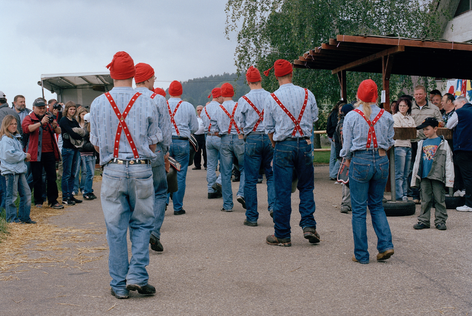The Topic
Swiss and international artists are invited to deal with the theme of living traditions (whether specific to Fribourg or elsewhere) to explore and question them, to appropriate them in a playful way and to give them an artistic reinterpretation. Cultural heritage is more than monuments and collections of objects. It also includes traditions, know-how and living forms of expression. UNESCO classifies intangible cultural heritage into five categories: oral traditions, performing arts, knowledge and practices concerning nature and the universe, or the knowledge and skills to produce traditional crafts. A living tradition is one that has been transmitted for at least two generations, is constantly evolving and gives those who practice it a sense of identity and continuity.
How do geography, religion and even political agendas influence the genesis, reactivation or development of traditions? How does participation in social and cultural practices contribute to the construction of identity? What kind of living traditions are currently emerging but have yet to be recognised as such? What will the living traditions of tomorrow’s society, shaped by mobility, commuting and migration, look like?
Global human migration is a 21st century reality. Local identities are on the move worldwide, with migrants bringing along memories of their own festivities, music and forms of expression, which then come face to face with the traditions of the places where they arrive. This prevails in the canton of Fribourg too. Demographic growth is high and the canton has the youngest population in Switzerland. Some 20 percent of its resident population are foreigners, with over 160 different nationalities. This constitutes a very real challenge: How do the cultural and social practices of “new” and ”old” residents cohabitate?
Viewing identity and culture not as something static but as processes which are being constantly renewed and shaped by narratives and contradictions, creolization and confrontation, mixes and separations opens up an immense creative potential for the societies of tomorrow.
Against the backdrop of a society which is progressively splintering into diverse parallel universes of cultural affiliation, Belluard Festival is in search of unexpected connections, surprising short circuits as well as formats that cross both cultures and generations.

EXAMPLES OF FRIBOURG’S LIVING TRADITIONS
Every year French-speaking districts stage plays in the local patois, a Franco-Provençal dialect. Stylised and traditional folk dances are practised by groups dressed in regional costume. Almost one in 35 Fribourg residents belongs to a choir; the Fribourg Choral Federation has around 7,200 members in 234 choirs. The reference to the Middle Ages is quite present in the imaginary of Fribourg, as in the annual commemorations of the Battle of Morat for example, or in legends and tales about the Dukes of Gruyère . It is from this universe that the figure of Chalamala emerges. The court jester to the Dukes of Gruyère, he was a prototype of the figure - still found in Fribourg today - who lives on the margins of society but dares speak truth to power.
Saint Nicholas, the patron saint of Fribourg, is celebrated every first Saturday in December with a procession attended by tens of thousands of locals. In autumn and at other points in the year, Bénichon brings together the people of Fribourg around sumptuous feasts and festivities. Pilgrimages are another tradition that is still much alive, as is the relation with Nature. Fribourg is also part of a larger region home to the ancient practice of “Le Secret”, the gift of healing through prayer.
A more recent addition to Fribourg’s list of living traditions is perhaps the “Our Lady of Centaurs Rally” in which hundreds of motorcyclists come to Fribourg Cathedral to have their bikes blessed. Likewise, the “Salons de Modeste”, which is held in February and involves around 20 Fribourg residents open their homes to strangers for the evening.
Living Traditions of Fribourg website (French and German only)